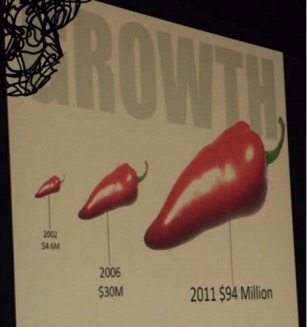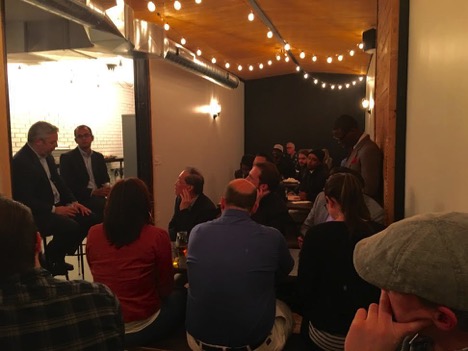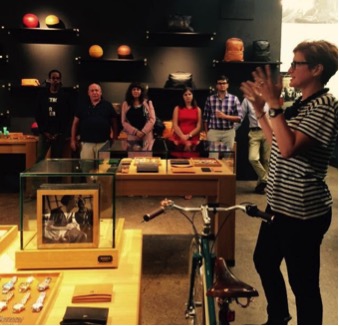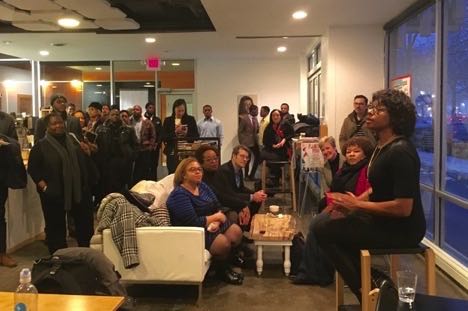10 lessons about scaling your business from our #HighGrowthHappyHour
Last year, Southeast Michigan Startup began telling the story of high growth companies in Metro Detroit. Here are our 10 favorite lessons from those #HighGrowthHappyHouse meet-ups.
Last year, Southeast Michigan Startup began telling the story of high growth companies in Metro Detroit, profiling people across the region who are shaking up their industries.
We’ve learned some important lessons from entrepreneurs who’ve overcome challenges, stuck to their gut, took incredible risks to innovate, and scaled to reach success. We shared some of these ideas in person through a series of casual happy hours called #HighGrowthHappyHour.
These meet-ups demonstrated that it is possible to scale, sell, and create something great right here in our region. Here are our 10 favorite lessons so far.

1. Just because it’s never been done before, doesn’t mean it’s impossible
Jack Aronson of Garden Fresh Salsa launched his salsa company after playing around with fresh salsa recipes in his restaurant kitchen. When the president of Hiller’s Market heard about his recipe and liked it, Jack felt encouraged to go big.
As Garden Fresh grew they focused on creating the greatest tasting product using high quality ingredients and a unique amount of fresh cilantro. Many people in the industry told Aronson he would never scale a fresh salsa company nationally; it was too difficult to preserve the product. He took a big financial risk and invested in HPP technology, a food preservation technique that helped him reach national distribution.
“We survived because our products were better,” he said. “The product won.”
2. Protect your brand value to the end
Major brands approached Aronson several times about selling his company. But it wasn’t until the RIGHT deal came along—a bigger and better offer that protected the brand he’d built, the team he’d grown, and the community he’d rooted himself in—that he agreed to sell.
3. Success is all about relationships
Carla Walker-Miller of Walker-Miller Energy filled the room at Cafe con Leche with sass and wisdom, sharing her frank advice for starting up and scaling in Detroit. She had to learn to meld her personal culture and business culture in order to succeed at building her own company.
When starting up, Walker-Miller saved up money to attend big conferences like the Mackinac Policy Conference and took every opportunity to meet anyone in the energy industry. Relationships were key to helping her land some of her first big deals, and help to keep her at the decision table as she scales.
4. Make your hiring decisions based on values
Another big takeaway from Walker-Miller’s talk was to remember to focus on the company’s values when making a hiring decision. She encourages her employees to succeed, fostering a collaborative culture where everyone is in it together to win. She looks to hire people who are diverse, collaborative, and willing to work together to get the job done.
5. Build and maintain a strong culture as you scale
So what happens when you’ve perfected the product, built the relationships, and are now growing fast? That sort of scaling can bring about all sorts of team problems. A strong culture will be needed to keep everyone heading in the same direction. Nathan Hughes of Detroit Labs says they hire slow and fire fast, but it takes more than that to scale a successful company culture.
“Look for storytellers. They help you maintain purpose and culture,” he told a room full of entrepreneurs.
Hughes works to clearly define and always communicate the mission of Detroit Labs, and asks potential hires what about it excites them. As the company scales, individual roles may change, but a culture built on clear communication and driven by purpose will encourage growth all around.


Jason Raznick, founder of Benzinga, broke into the competitive world of financial media by carving out a niche. Jason started Benzinga in his basement with a self-published feed of insights for small cap news, companies the national financial media was not covering.
Raznick was able to quickly grow his audience, and now has over 30 employees working out of their office in downtown Detroit. They’ve found a niche that worked for them, but Jason warns to stay focused to the core value your business provides.
7. Investment funding is not for every growing company
Serial entrepreneur and investor Sean Ammirati dove deep into the myths around venture capital and fundraising. Ammirati pointed out several times that venture capital is not the best option for everyone—if you can scale with organic cash flow or loans, you don’t need venture capital. He also warned to be careful with strategic investors; it’s not always the best option for everyone.
8. There’s a difference between growth and scaling. Which do you want?
At one of our most recent #HighGrowthHappyHours, we hosted a panel discussion on building a strong foundation from the beginning. All the panelists noted that scaling and growth are not necessarily the same thing. Justin Anderson of Solidea Capital defined scaling as growing rapidly across multiple markets, while more traditional growth may require expanding into a new vertical or market.
Are you aiming to scale big? It’s important to ask yourself what your company wants to do on its growth path, and be intentional as you plan to get there.
9. Create a story around your brand that resonates with customers
Shinola CMO Bridget Russo shared great storytelling tips with the crowd at our first #HighGrowthHappyHour. The luxury brand actually started with social media first, gaining feedback as they designed their product. Russo says they created meaning behind the brand by sharing messages of buying and supporting local that resonated with people around the world.
10. Know how to use “OPM”—other people’s money—to scale
During one of our first events, successful food entrepreneurs shared how to scale in the food industry. Michael Ansley, founder of Bagger Dave’s and CEO of Diversified Restaurant Holdings, said he hit a wall with his growth. He turned to a mentor who told him to leverage “OPM”—or other people’s money. Ansley took on investment to help him scale quicker, opening more Bagger Dave’s locations.
We’d love to hear your insights as we continue our #HighGrowthHappyHour this year:
Stay tuned for our next in-person events by subscribing to our newsletter and following us on Facebook and Twitter.





